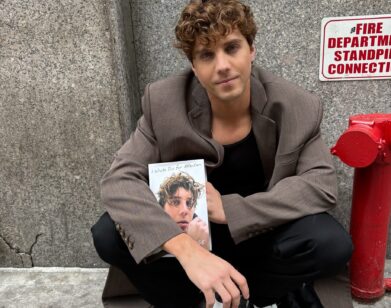LET'S FUN
Beatrice Grannò and Simona Tabasco Are Savoring the Moment

In the first episode of The White Lotus season two, which brings a new cluster of disaffected guests to the titular resort in Sicily, Lucia licks a lollipop next to her best friend Mia, as both locals fix their eye on their moneyed prey. Lucia, a local sex worker played by the 28-year-old actor Simona Tabasco, cajoles her best friend Mia, played by real-life longtime friend Beatrice Grannò, into her exploits, which at first involve dawdling around the panoramic seaside hotel, searching for guests to seduce. But by last weekend’s penultimate episode, as the precarious social contract among the vacationers break down, both women are fully on the inside, having ensconced themselves in the show’s fragile ensemble: Lucia is sleeping with Albie, the son of Dominic Di Grasso, who she slept with a few nights earlier, while Mia is playing jazz standards in the hotel’s lobby bar, hoping to catch her big break. That both characters have been given such rich arcs in a show overflowing with outsized performances is a testament to Tabasco and Granno, who after working steadily in film and theater for over a decade have relished the opportunity to show American audiences their considerable talents (and the many regional nuances of Italian accents). Days before the show’s season finale, airing this Sunday, they interviewed each other about working with Mike White, their “pinch me” moments as actors, and seeing Americans through Italian eyes.—MIRA KAPLAN
———
BEATRICE GRANNÒ: I’m gonna drink a glass of water for this.
SIMONA TABASCO: I thought it was wine!
GRANNÒ: It’s not alcohol, Simona! It’s not! First of all, Simona, what is that pink thing hanging on the television?
TABASCO: It’s my hat I bought in California.
GRANNÒ: Can you wear it for this conversation? I really feel like it will help me connect.
TABASCO: I like colors! And I like my California hat!
GRANNÒ: I loveeeee it. I remember where we got that together in that Hollywood place.
TABASCO: You bought an Oscar!
GRANNÒ: No, I didn’t buy it! I was going to, but then I was like, “This is lame.” You know, I’m not gonna buy a fake Oscar. But I remember we were so excited in that shop. We just wanted to buy everything. And that’s quite funny because we were actually like, two Italian girl tourists in America. And I think that’s the most tourist I’ve felt in my whole life.
TABASCO: Yes, me too. But what is the Oscar you wanted to buy? Because it had a long description on it.
GRANNÒ: I wasn’t going to buy any fake Oscar. Simona is making this up! I can’t remember. “Best…”—do you remember any of them?
TABASCO: I remember that Gianni [Simona and Beatrice’s agent] wanted to buy “Best Agent.”
GRANNÒ: He did! He bought so many of them for the agency because he wanted to bring back gifts. Straight after that we went to have dinner with the rest of the cast. I remember Adam (DiMarco) asking us, “So, what did you guys buy?” And Gianni told me in Italian, “I’m not going to show them.”
TABASCO: And I also remember the pizza on the plates.
GRANNÒ: It was very good actually! You know, it’s not easy to make a pizza. Simona, what is your favorite dish?
TABASCO: In the world?
GRANNÒ: Like if you had to choose the last thing before dying. That’s very dramatic. Let’s say, you’re 100 years old, so it’s fine, and your life came to an end. And you have to pick one dish.
TABASCO: I think brodino with pasta.
GRANNÒ: What?! That’s my favorite. No!
TABASCO: I’m joking because Beatrice told me this when we were in Taormina having lunch. And she was like, “What is your favorite dish before you die?” And I was like, “Why this question? French fries or pizza or meatballs.”And she was like, “Oh my God, I wish I could have brodino with pasta!”
GRANNÒ: Brodino is like soup. But it’s not as lame as she makes it sound. My favorite thing in the world is the broth. When I was really young, my mom used to make it for me. So every time I feel lonely and I feel down, I have that and it’s warm and it’s like a candle.
TABASCO: Bea, the next lunch with brodino, I’ll ask if you want chamomile instead of wine.
GRANNÒ: I love chamomile! I love everything that is warm. It kind of makes me feel hugged. So, Simona, when was the first time you felt so happy to be an actress that you realized you were going to do it for the rest of your life?
TABASCO: I think I’m realizing now, after 10 years of doing this job, that it could be my future, my work. I’m happy on set. I’m happy during the process of auditions. I’m happy because we can meet a lot of people with different cultures and different thoughts. I like the way we can have a confrontation, a rich exchange of thoughts so often with other people. And you?
GRANNÒ: The first time I realized that I wanted to be an actress and felt that I was gonna do that for the rest of my life was in Edinburgh at the Fringe Festival with my theater company. The Edinburgh Fringe Festival is really hard because it’s one month and you do a show every night. And you only get people in by word of mouth. The first night, nobody was there, and it was just us performing for maybe one or two people. But at the end of the month, we sold out the last. When we finished, I felt so full that I thought I was going to do that for the rest of my life. I was so happy. Because drama school, it’s hard. You never feel like you’re good enough. It’s meant to break you apart in order to build you back up. But that show, for me, was the first time realizing that I was made for it. And even if I wasn’t the best, I loved it so much that I wanted to work on it.
TABASCO: Wow. I love the way you speak about your things. You have a specific light in your eyes.
GRANNÒ: That’s so nice. Same with you, Simona. You’re very passionate. And I always tell you this, but it’s true. I definitely feel like you have a story that wants to explode out of your mouth. That’s a very bad image, but I can tell there’s something there that you always want to put out. And it can be anything, but it’s always there. And that’s going to be your engine, tuo motore, to make things happen. You should always keep that. And then you have butterflies in your belly. And you keep them safe. You never let them fly. You’re always like, “I have this excitement here and I’m just going to protect it.” And I really love how you take care of yourself in that sense.
TABASCO: I want to hug her! Bea, it’s only… come si dice nausea?
GRANNÒ: Did I make you nauseous with all this?
TABASCO: No, no, no, no!
GRANNÒ: You’re saying it’s anxiety! See how she has so many muscles here? Maybe that’s anxiety there. When Simona celebrates, she always does this dance [raises fists as if holding maracas]. I don’t know what it is.
TABASCO: It’s a move. When you celebrate, I always remember you rolling a cigarette.
GRANNÒ: Nobody ever told me that!
TABASCO: Yes. You’re not a great smoker. But sometimes, when you’re happy.
GRANNÒ: That’s money, Simona! I’m happy because I’m making money!
TABASCO: Oh yes, I forgot.
GRANNÒ: When I went to LA, I realized that nobody smokes there. And you have specific smoking areas, but it’s not a thing, which is very good. Me and Simona, we smoke when we celebrate. It’s very common in Italy to smoke. It’s also very common to roll your own cigarette. And I remember one of the first days on set, I had this homemade cigarette and they were going, “Oh, you made that?”
TABASCO: When I was in Japan, I saw people going to a different area to smoke. It was strange. Here, you can smoke anywhere. I usually steal cigarettes from Beatrice.
GRANNÒ: She does, every time.
TABASCO: Every time.
GRANNÒ: But Simona, I wanted to ask you one question. Do you remember the first night we were in Taormina?
TABASCO: Yes, I can remember it.
GRANNÒ: Do you remember what we were doing?
TABASCO: Studying?
GRANNÒ: Yes, we were studying. And how was that?
TABASCO: Pretty funny. It was very emotional, because we were in Taormina together, starting to shoot this amazing show called The White Lotus. We were happy.
GRANNÒ: I remember this moment when we opened a bottle of wine.
TABASCO: My god, it was so good! “Etna Rosso.”
GRANNÒ: It was so good. And we cheered and I remember I said, “Okay, Simona, maybe it will never happen again, but this is a great moment.” I remember both of us getting a little bit emotional.
TABASCO: And starting to imagine what Mia and Lucia could be like. And I remember your room. You had a keyboard and a ukulele, all these instruments in your room.
GRANNÒ: I brought all the instruments because I was practicing. And I was so scared that people in the other rooms would hear me. Actually, could you hear me? Now you can tell me!
TABASCO: Sometimes, yes.
GRANNÒ: What?!
TABASCO: I think you had the window open. By the way, it was a pleasure to hear.
GRANNÒ: I can imagine you like, “When will she stop?” Mike was using a lot of songs to soundtrack what was happening [in the show]. I think The White Lotus is a series about Italy seen through [the eyes of] Americans. That’s why I sing “That’s Amore”, which is not an Italian song. It’s an American song. So that’s why he made me sing in English. And also, “The Best Things in Life Are Free” by Sam Cooke, which is an amazing song and a great choice in that moment, because she’s talking about the relationship between her and Lucia. It was such a sweet moment, because I think that song really talks about pure love and friendship. Before doing that song, I was panicking. I was asking for ginger and lemon. It was four o’clock in the morning. I was like, “How am I going to do this? I haven’t rehearsed enough. I don’t know what to do.” I didn’t think of myself as good enough to do that. And I looked at Simona and she looked back. Maybe you can confirm this, Simona, but you were looking at me like, “Beatrice, you can do this.” You really wanted to be there for me as Lucia, but also as Simona.
TABASCO: But you’ve done it because you’re so talented. And you were so happy to be there to sing those pieces. I remember the moment you said you realized, “These are pieces of music history!”
GRANNÒ: All the references I had were jazz music. But at the same time, Mike White wanted Mia to be much more simple, more down to earth. He didn’t want her to be as sophisticated.
TABASCO: I have a question. How would you describe your perfect romance?
GRANNÒ: She does this all the time.
TABASCO: I know, it’s unexpected.
GRANNÒ: My perfect romance is just very boring, it’s very romantic. Dinner and then a movie. I love when you’re kind of growing together, so you always have a conversation. And in a romance, what I’m looking for is that deep connection. And it’s not influenced by fear or things you don’t want to say. I just want to be able to feel myself and have a ton of transparency to say how you feel. I think that’s my perfect romance. Very boring, but a true relationship.
TABASCO: I completely agree with your ideas of romance. But also, I’d love to pass the night like Lucia and Mia in the pool with the guys.
GRANNÒ: I know you do.
TABASCO: Just to change it up sometimes.
KAPLAN: You said the show is Italy seen through American eyes. What are your experiences of America?
GRANNÒ: I’ve been to Los Angeles and Florida, when I was really young, so I don’t have a complete vision of it. But when I went to LA, I realized that it’s not a place that really invades you. You have to invade it. That’s something Aubrey Plaza told me, so I’m stealing that from her. And she was so right. Right next to you, there’s the biggest situation or party or occasion, but it will never come to you, you have to be the one that goes there. And everybody smiles at you in the street. In Los Angeles, I would give a smile back. Sometimes I loved it and sometimes I was like, “What do you want from me? Why are you smiling?” In Italy, people are chatty, but not always. They just think about themselves, you know?
TABASCO: I find this all the time. I find maybe in different cities, we have a lot of different cultures and different behaviors, but I think most of the time, I meet people who are just into their own stuff. And that’s why I love the smiling of the American people and their openness to others.
GRANNÒ: But then one night, we went to have dinner. They were serving a pizza. The name of the ham was spelled wrong and it cost like, $170. I was like, “This can’t be, this is crazy.” In Italy, that’s the simplest thing you can find.
KAPLAN: What do you think about how Italian was written in the show?
GRANNÒ: Of course, for American people, Italian all sounds the same. But it’s different. I am from Rome and Simona is from Naples. We both had to work on a Sicilian accent. We were playing a very soft kind of dialect. It wasn’t that strong one from Catania. But if you go to Palermo, it’s a completely different sound. At the beginning, that was the thing that scared me the most. I was worried that people from Sicily would not be happy with it. After episode six, I received so many messages from Sicilians actually. When I said un gran pezzo di sticchio, it’s a Sicilian way to say “You’re really hot.” And it’s very specific. So many people from Sicily were saying, “Oh my god, she said that on an HBO series!” I was very proud.
TABASCO: In the script and the dialogues that we had, we were free to do a lot of what we felt worked better. We worked with Chiara [Nanni, Mike White’s production assistant and the show’s translator] with not just words, but gestures, for example, things that are particular to Sicilian culture. And Mike was great, what he did with the dialogue and with the writing overall.
GRANNÒ: Simona, I have one more question for you. But don’t turn it on me this time! Answer! What’s your dream role right now?
TABASCO: I think a cartoon, just the voice of a cartoon.
GRANNÒ: Really?
TABASCO: Yes, like a character similar to Lisbeth Salander of The Girl With The Dragon Tattoo.
GRANNÒ: Wow.
TABASCO: Yes, like a bad girl.
GRANNÒ: I love that!
TABASCO: And you, Bea?
GRANNÒ: I just want to play a woman from the 40s. There’s something about that pain that they had. At that time, women were so blocked. But there’s also beauty in that sadness. It would be exciting for me to do that. But to be honest, I don’t really have a dream character. That’s why I asked you, because I’m always curious when people have one because I don’t. I don’t know who I want to play but I know the stories I want to tell.
TABASCO: Maybe a woman…
GRANNÒ: No, say it! Come on.
TABASCO: Stupid things, really.
GRANNÒ: I love stupid things!
TABASCO: I think…
GRANNÒ: You’re trying to make it clever!
TABASCO: A woman of the 40s, but in the future.
GRANNÒ: I love it. Like a woman from the 40s that went through the time machine, but in the future, and she’s just clueless. I love that.
TABASCO: Maybe things will change. Or maybe not?
GRANNÒ: Write this movie, Simona! I’m gonna produce it and you‘re gonna play the bad girl.







